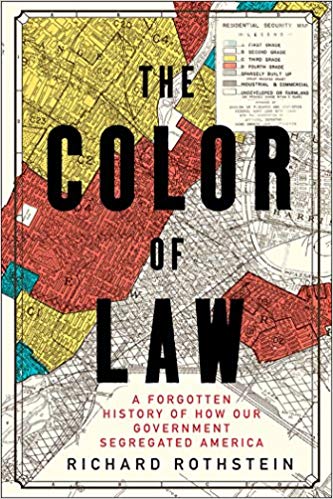This recommendation comes from another long-time friend. I’ve known him since my freshman year in college. I was in his wedding. During my first year in Delaware, I would routinely drive down to Baltimore to play dominoes and drink vodka with him. I also wrote him in 2007 which I mention in My Story. Most recently, I saw him on my road trip last March, along with his wife and child. He’s been a great friend and hopefully I will see him again soon.
Recommendation #21 from Ben Lydecker
The Color of Law by Richard Rothstein

The Color of Law – A Forgotten History of How our Government Segregated America is an eye-opening account of all the ways federal, state, and local governments, as well as non-profits, private institutions, and police / judicial systems. It investigates the laws and policies enacted since the 13th amendment and 2016, primarily focusing on housing and related policies in lending, zoning, and city planning.
“Today, most Americans understand that prejudice toward and mistreatment of African Americans did not develop out of thin air. The stereotypes and attitudes that support racial discrimination have their roots in the system of slavery upon which the nation was founded. So to most of us, it should now seem reasonable to agree that Congress was correct when it determined that prohibiting African Americans from buying or renting decent housing perpetuated second-class citizenship that was a relic of slavery.”
Rothstein makes the case for a de jure system of residential segregation. A system that was created by government policy and must be confronted and reversed by the same standard. Our country has a constitutional obligation to reverse these systems. “Most Americans have an image of public housing: groups of high-rise towers with few amenities or parks, packed next to one another in central city neighborhoods, plagued by crime and drugs, and filled with black (or Hispanic) mothers and their children. It’s a mostly inaccurate image even today, but it couldn’t be further from the reality of public housing when it began in the mid-twentieth century.”
By examining the FHA, the IRS, city planning, contracts and deeds, the mortgage industry, and many other public and private industries, Rothstein brings increasingly amounts of evidence to his argument. I found myself thoroughly convinced that he is correct in his diagnosis. Government played a critical role in setting up unjust laws to hurt racial minorities.
What can be done?
The author does volunteer some possible fixes, but all seem very far off. Mainly because our own congress and president can barely agree on funding of the government itself. This book, however, just might be the start to something bigger. Often, any big change requires education, thought, and debate to determine what is the best way forward. So, that is my hope. That, just like in every other way, we continue to see forward progress in our understanding and treatment of our neighbors, “others”, and “those people”.
Today is May 1st, 2019, and I just announced this month’s playlist on Facebook, Instagram, and Twitter. The song for today is by a new trinity artist to my playlists. They previously had a song on Fellowship (April 2019’s playlist) called If We Fall. Their music is very catchy and the lyrics of each spoke to me. Plus, I’ll be driving to Denver soon. I hope you enjoy Just Drive.